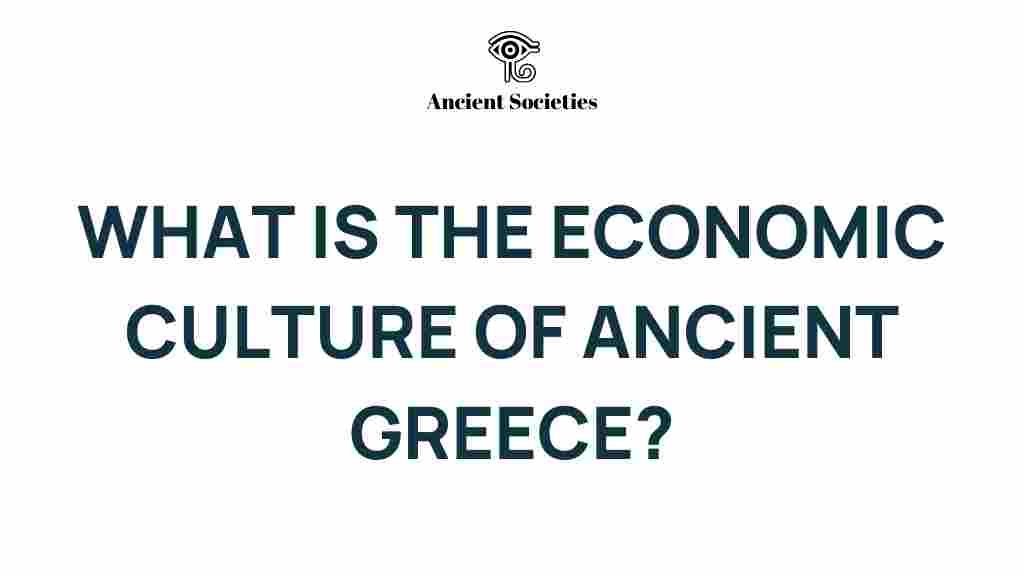Unearthing the Economic Culture of Ancient Greece
Ancient Greece is often celebrated for its profound influence on modern civilization, particularly in the realms of philosophy, democracy, and art. However, the economy and culture of Ancient Greece also played a pivotal role in shaping its society and history. This article delves deep into the economic culture of Ancient Greece, exploring its trade, commerce, agriculture, and societal wealth.
The Economic Structure of Ancient Greece
The economy of Ancient Greece was diverse and complex, characterized by various sectors including agriculture, trade, and craftsmanship. Understanding the economic framework of Ancient Greece is crucial to grasping the broader cultural dynamics of the time.
- Agriculture: The backbone of Ancient Greek economy, agriculture was primarily based on the cultivation of grains, olives, and grapes.
- Trade: Due to its geographical location, Ancient Greece was a hub of trade, connecting Europe, Asia, and Africa.
- Craftsmanship: Skilled artisans produced goods ranging from pottery to textiles, contributing to both the economy and cultural identity.
Agriculture: The Bedrock of Wealth
Agriculture formed the foundation of the Ancient Greek economy. The fertile plains of Attica and the Peloponnese were ideal for farming, allowing communities to thrive.
- Crops: Key crops included barley, wheat, olives, and vines. The cultivation of olives and grapes was particularly significant, as they were essential for olive oil and wine production.
- Livestock: Sheep and goats were the primary livestock, valued for their wool, milk, and meat.
Trade and Commerce: Connecting Civilizations
Trade was vital for Ancient Greece, enabling the exchange of goods, ideas, and cultures. The Greeks established trade routes across the Mediterranean and beyond.
- Maritime Trade: The Aegean Sea facilitated maritime trade, where merchants transported goods to and from various ports.
- Marketplaces: Agora served as the central marketplace in city-states, where citizens gathered to buy and sell goods.
Trade not only boosted the economy but also enhanced cultural exchange, leading to the spread of Greek culture throughout the Mediterranean.
The Role of Currency in Ancient Greek Economy
The introduction of coinage revolutionized the economy of Ancient Greece. Coins were used as a standardized medium of exchange, making trade more efficient.
- Types of Currency: Silver was the most common material for coins, with the Athenian drachma being one of the most widely used.
- Impact on Trade: The use of currency facilitated long-distance trade, allowing merchants to engage in commerce with distant lands.
Societal Impacts of Economic Practices
The economic practices of Ancient Greece had profound effects on its society. The wealth generated from agriculture and trade led to the emergence of distinct social classes.
- Landowners: Wealthy landowners dominated the economy, owning large tracts of land and employing laborers.
- Merchants: Successful merchants accumulated wealth and often held significant political power.
- Laborers and Farmers: The majority of the population consisted of farmers and laborers, often struggling to improve their economic situation.
This stratification resulted in a complex social hierarchy that influenced political dynamics and cultural exchanges.
Cultural Exchange through Trade
Trade in Ancient Greece was not only about material goods but also about the exchange of ideas and culture. As merchants traveled, they brought back new customs, art, and philosophies.
- Art and Architecture: The wealth generated from trade allowed for the patronage of artists and architects, leading to the construction of iconic structures such as the Parthenon.
- Philosophy and Knowledge: The interaction with other civilizations enriched Greek philosophy, leading to the works of great thinkers like Socrates, Plato, and Aristotle.
Challenges in the Economic Landscape
Despite its successes, the economy of Ancient Greece faced challenges that affected its stability and growth.
- Geographical Limitations: The mountainous terrain limited agricultural expansion, leading to competition for fertile land.
- Wars and Conflicts: Frequent wars, such as the Peloponnesian War, disrupted trade routes and strained economic resources.
- Dependency on Trade: Reliance on trade made the economy vulnerable to external factors, such as piracy and political instability in neighboring regions.
Conclusion: The Legacy of Ancient Greece’s Economic Culture
The economy and culture of Ancient Greece are intricately linked, demonstrating how economic practices shape societal structures and cultural developments. The wealth generated through agriculture and trade not only enriched the lives of the Greeks but also laid the groundwork for their artistic and intellectual achievements.
Today, the lessons from Ancient Greece’s economy continue to resonate, reminding us of the importance of trade, agriculture, and cultural exchange in fostering societal growth. For more insights into the economic history of ancient civilizations, you can check out this resource.
By understanding the economic culture of Ancient Greece, we gain valuable perspectives on how societies evolve and thrive through commerce, agriculture, and cultural interactions.
For those interested in a more comprehensive exploration of this topic, consider visiting this link for additional historical context and analysis.
This article is in the category History and created by AncientSocieties Team
